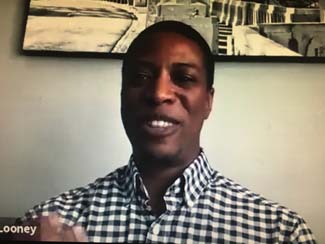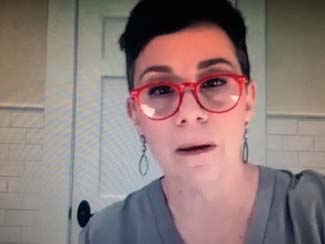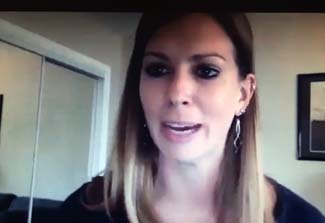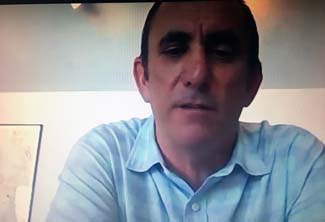
Other items in today’s column include
*Political bytes
*Recommended reading

SAN DIEGO — Jewish Family Service of San Diego on Tuesday sponsored an internet panel discussion posing thorny questions about the Jewish community and race relations. The panel brought together Rabbi Yael Ridberg of Congregation Dor Hadash; Micah Parzen, the executive director of the San Diego Museum of Man, and Kelly Greenberg Young, education director for the San Diego regional office of the Anti-Defamation League. The moderator was Nate Looney, an African-American Jew who is Avodah’s recruiter of Jews of Color.
Looney posed questions requiring the panelists to be introspective such as “What does White privilege mean to you?”; How does Jewish identity fit into the concept of White privilege?; What do you do if you make a misstep dealing with a member of another minority group?; and What can be done to further weave Jews of color into the overall Jewish community?
Greenberg Young said that over the last two weeks since the killing of George Floyd in Minneapolis and the nationwide protests, she has felt exhausted just talking about the reasons for racism in this country. How much more difficult is it for Black people to experience it! Unlike Black people, she has the ability to just remove herself from the controversy by unplugging for a while. Black people live with racism every moment.
Rabbi Ridberg said her understanding of “White privilege” is the fact that people see her as White. They don’t know who she is, that she is educated, that she has friends, or her religious preference. Because of the acceptance her whiteness confers upon her, she was unaware until recently, when she visited the Equal Justice Initiative’s Legacy Museum in Montgomery, Alabama, “how close the experience of slavery is to Black people.
Parzen said because he is White he had career opportunities that would be denied to people of color. He said the benefits he has had in his life “have come at a painful cost to my fellow human beings.” Similar to “White privilege, he said, is “settler privilege.” Most San Diegans don’t know that the land they live on once was owned by the ancestors of the Kumeyaay people, and was forcefully taken away from them. These facts create an obligation to make that right, he said.


Moving specifically to the question of Jewish and White identities, Ridberg said that many American Jews trace their roots to Eastern European ancestors who suffered discrimination and moved to the United States “yearning to breathe free” (as it says on the Statue of Liberty). Once they got to America, they did whatever they could to integrate themselves into American society, imitating the White Christian majority and inheriting the racial benefits of that majority. She said Jews must look to their biblical tradition, asking not only “where are we” but also where are our brothers?


Greenberg Young related that she lives in Poway, where one winter day vandals painted a swastika on a neighbor’s house where Chanukah decorations had been displayed. That prompted her and her husband to discuss whether they should take down their decorations to protect against a similar attack. The point, she said, was that they had a choice; they could take down the decorations to blend into the majority culture, or they could advertise their Jewishness. Black people do not have such a choice.
On the issue of what to do if you make a racist remark, even if it is inadvertent, Parzen said in unlearning racism, everyone can make a misstep. No one likes to do wrong, and if that wrong is “called out, or called in,” it is important to neither become angry not defensive. “I try to take a deep breath, get into a mode of humility,” and thank the person who points out the error, then apologize, and commit to do better, he said. While the person who made a racist remark may have thought it an “innocent mistake,” it may have opened the wound of the person hearing it.
Ridberg commented that Jews try to atone for their sins during the High Holy Day rituals, but missteps can occur in “real time.” She said people may ask themselves “what brought me to that behavior?”; what were the conditions that led to it, and “how can I change those conditions — if you understand you hurt the person, you want to do better.”
Greenberg Young said she doesn’t know the answer to the question but what she does know is that “the opposite of injustice is not inaction. … If I mess up, I have to acknowledge it, and learn from it.”
That led to a question about “implicit” or “internal” biases –the kind of assumptions you grow up with that are hurtful.
Greenberg Young said sometimes these unrecognized biases are in direct contrast to people’s deeply held moral beliefs. To correct them, she suggested, people should “dive” into the issues, by searching the Internet to learn where the biased idea came from and how it became part of our lives.
Ridberg said synagogue welcoming committees sometimes reveal their implicit biases when they assume that a black person who comes into a synagogue either is someone who has lost his or her way, or is in the wrong place. They ask such questions as “what are you doing here?” The implicit bias is that the Jewish community is a White one, despite the fact that Jews of Color may be found the world over.
To Looney’s question about how Jews of Color may be further woven into the fabric of the Jewish community, Greenberg Young said from her ADL perspective that non-profit organizations should reexamine their recruiting processes. Where are they advertising? Are they looking for people who look like themselves or are they truly valuing diversity?
Riberg said Jews of Color may be found across all Jewish denominations. She suggested that rabbis and synagogue board members ask themselves the questions,, “Who is not in the room? Why aren’t they in the room? How do you get them to the table?”
Parzen said it is important not only to give minorities a seat at the table, but to “back them up” when they offer a different perspective that may be discomfiting.
*
Political bytes
*Congresswoman Susan Davis is surveying her constituents’ opinions about these questions: 1) Do you believe police reform is needed? 2) Have you had a recent encounter with police? 3) What issues have the recent nationwide protests made you think about?; 4) What proposed reforms (if any) do you believe Congress should focus on?
*Assemblyman Todd Gloria, a candidate for mayor of San Diego, says he has been refused permission to donate blood and plasma because of “arcane and homophobic federal restrictions.”
“The FDA continues to prohibit gay and bisexual men from donating blood or plasma, which is discriminatory and unnecessary,” he messaged. “As a gay man, I am saddened that I cannot do my part to support our hospitals and clinics that have needed blood and plasma donations to tend to patients.
“More than that, this policy has put all San Digans at greater risk during this panemic by reducing our local blood supply and by restricting who can give plasma, which is the key to obtaining the antibodies necessary for research toward a COVID-19 vaccine.”
He called upon supporters to sign a petition calling for the ddnd to the FDA ban on gay and bisexual blood and plasma donors. Additionally, since he is unable himself to donate blood or plasma, “I hope some of my ally supporters will consider donating on my behalf.”
*
Recommended reading
*Rabbi Michael Berk, spiritual leader emeritus of Congregation Beth Israel, has an Op-Ed in Times of San Diego saying it’s not law and order we need, but rather justice and righteousness.
*
Donald H. Harrison is editor of San Diego Jewish World. He may be contacted via donald.harrison@sdjewishworld.com